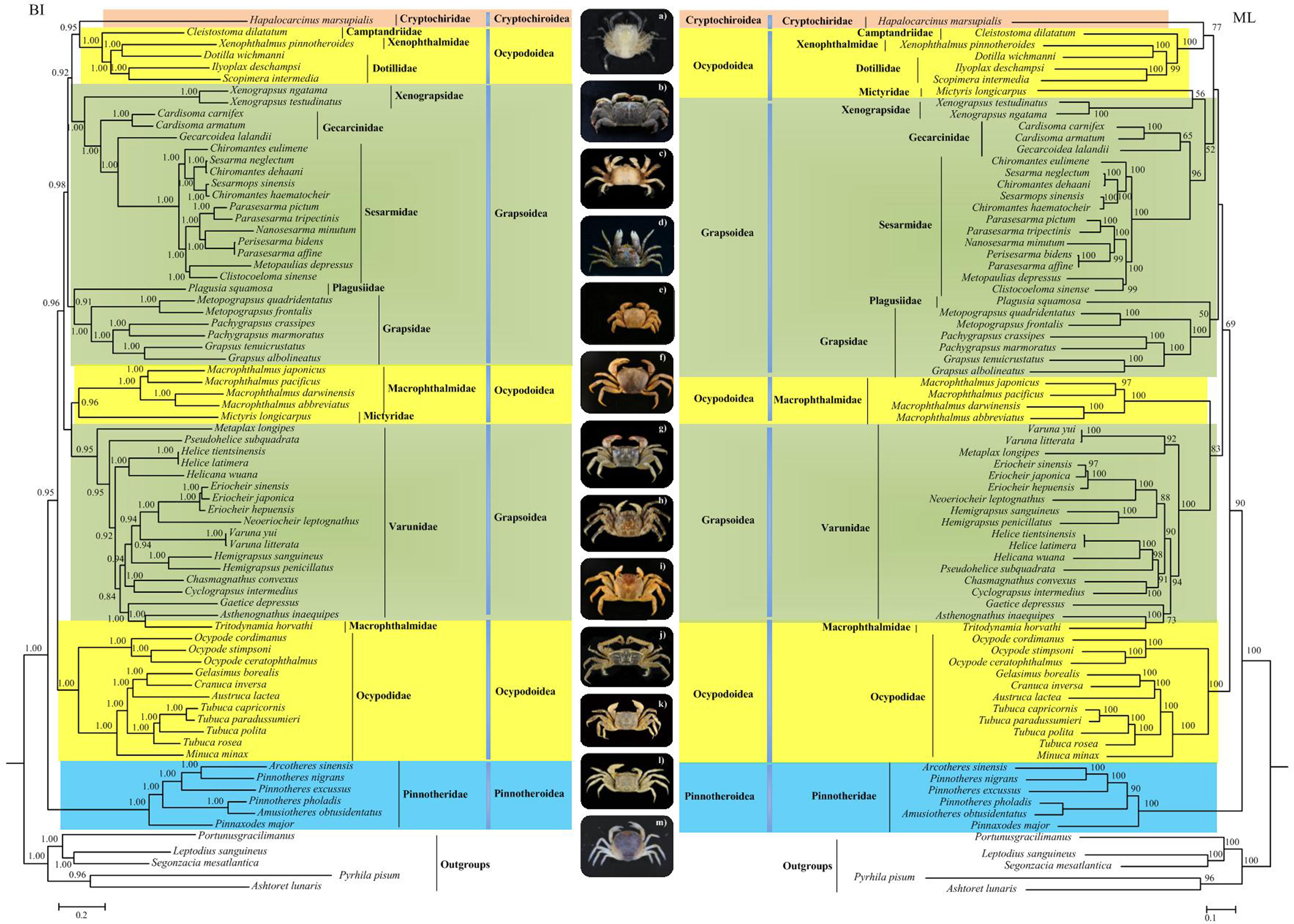The subsection Thoracotremata (Brachyura, Decapoda) is the most derived crab group, which encompasses 1,248 extant species. It currently comprises four superfamilies, Grapsoidea MacLeay, Ocypodoidea Rafinesque, Cryptochiroidea Paulson and Pinnotheroidea De Haan. As one of the most diverse crab groups with diversified lifestyles, the phylogenetic relationships of Thoracotremata are confused and require further investigation.
Recently, the research team led by Prof. SHA Zhongli from the Institute of Oceanology of the Chinese Academy of Sciences (IOCAS) revealed the evolution of mitochondrial gene order (MGO) among thoracotremes, and provided new insights into the internal phylogenetic relationships of Thoracotremata.
The study was published in Frontiers in Marine Science on Apr. 14.
In the study, twelve new mitogenomes from the four thoracotreme superfamilies were obtained, which greatly enhanced taxonomic coverage of Thoracotremata mitogenomic data. Nine distinct patterns of MGO among thoracotreme mitogenomes were identified, with four MGOs newly found in present study.
The symbiotic groups, the cryptochiroid and pinnotheroid crabs, display variable MGOs, providing evidence for possible correlations of rearranged MGOs to the adaptation to specialized lifestyles.
The expanded Thoracotremata mitochondrial phylogenetic relationships were resolved for the first time. The Pinnotheroidea formed the basal monophyletic clade. Cryptochiroidea grouped with an ocypodoid lineage (Dotillidae/Xenophthalmidae/Camptandriidae) located at more evolved position, indicating that commensalism may has evolved independently multiple times within Thoracotremata.
Moreover, the macrophthalmid crab Tritodynamia horvathi from Ocypodoidea showed more closely related to the varunid crab Asthenognathus inaequipes from Grapsoidea, which supports the inclusion of Tritodynamica in the family Varunidae.
"The phylogeny of Thoracotremata and the phylogenetic position of Cryptochiroidea and Pinnotheroidea within Thoracotremata were first estimated using mitogenomic data by inclusion of representatives of all available thoracotreme superfamilies. This study also provides a novel insight towards understanding the internal phylogenetic relationships of the thoracotreme superfamilies," said Dr. SUN Shao'e, first author of the study.
"The phylogenetic relationship based on mitogenomes was of great value to the studies of biodiversity, origin and evolution, and biogeography in Thoracotremata," said Prof. SHA.
This study was supported by research grants from the National Science Foundation for Distinguished Young Scholars, the Key Research Program of Frontier Sciences, Chinese Academy of Sciences, the National Natural Science Foundation of China, and the Strategic Priority Research Program of the Chinese Academy of Sciences.

The phylogenetic tree of Thoracotremata derived from Bayesian inference and Maximum Likelihood analyses using 13 protein-coding genes
Sun, S., Jiang, W., Yuan, Z., Sha, Z. (2022). Mitogenomes Provide Insights Into the Evolution of Thoracotremata (Brachyura: Eubrachyura). Front. Mar. Sci. 9: 848203.
SUN Shao'e, SHA Zhongli
Institute of Oceanology
E-mail: sunshaoe@qdio.ac.cn; shazl@qdio.ac.cn
(Editor: ZHANG Yiyi)
|
|

Address: 7 Nanhai Road, Qingdao, Shandong 266071, China
Tel: 86-532-82898902 Fax: 86-532-82898612 E-mail: iocas@qdio.ac.cn


